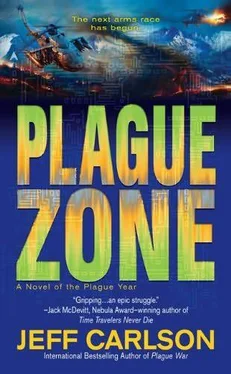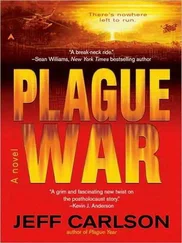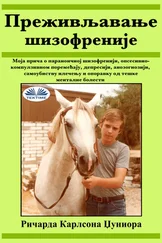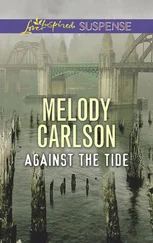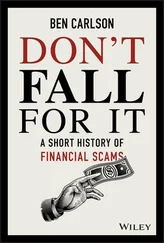“What?” Foshtomi barked. “Ask them what the fuck that means,” she said as Huff clicked at her SEND button and said, “Say again, Viper. Your people are infected?”
“We’re in suits but we’re covered with nanotech,” the woman answered. “You can’t touch us. Not yet.”
“What do we do?” Bobbi asked. “Ruth? What do we do?”
There’s nothing we can do, she thought, but it was her job to find a way. “The lake,” she said. “They need to wash off in the lake. They’ll probably just pick up more nanotech on the shore, but they have to try. Then I’d have them scrub each other with dirt.”
“Those zombies will be on top of us in five minutes,” Cam said.
“We need twenty minutes,” the woman on the radio said. “Then we can clear your vehicles, too. Buy us some time.”
“Roger that, Viper,” Sergeant Huff said.
“I want One and Three to sweep the road,” Foshtomi said as she dug for a pair of binoculars. “No guns. Just run ‘em down. Is that understood?”
“Yes, ma‘am,” Huff said without meeting her eyes, and Ruth felt the same squeamish sense of alarm. It was one thing to shoot innocent people from a distance. Intentionally using the Humvees as battering rams was hideous, but Huff began to relay Foshtomi’s orders. “This is Two,” she said. “Listen up.”
Foshtomi turned to Ruth. “How is Viper going to decontaminate?”
“I don’t know.”
An engine rumbled behind them as one of the Humvees rolled past. The other Humvee appeared from the corner of the bank and followed. Ruth was very, very glad she wasn’t in those vehicles, but it had always been that way, hadn’t it? Other people did the dirty work while she was safe.
“I think I see them,” Foshtomi said. She lowered her binoculars and got up on her seat, twisting in the confines of the Humvee to find a better angle through the windshield. “Shit. They’ve got a drape or something like a tent.”
“You mean an airtight tent?” Bobbi asked.
“That wouldn’t work,” Ruth said. “This plague doesn’t have the hypobaric fuse.”
“It’s just some kind of blanket.” Foshtomi slid back into her driver’s seat and handed the binoculars to Ruth. “Tell me what you see.”
Suddenly the radio squawked, full of the sound of a growling motor. “Watch out!” a man yelled. Then the noise shut off. He was gone.
“One and Three,” Huff said. “One and Three, are you okay?”
Please be okay, Ruth thought, but the radio answered in the same man’s voice. “This is One,” he said. “I think Three’s infected. They nearly hit us.”
Foshtomi punched the ceiling. “Fuck!”
“We’re coming back around,” the man said. “He’s off the road. We — Yeah, I can see Coughlin. He’s sick. They’re all sick.”
Ruth was trembling too hard to see through the binoculars when she finally brought them to her eyes. Then she realized she was crying again. We just let five soldiers be infected to save a few others, she thought. We just lost five people, plus everyone they killed in the street… Maybe that kind of math was necessary, but it felt evil, and she struggled with her helpless guilt and self-reproach.
The hillside beyond the remnants of the town was brown and green. Ruth spotted a yellow figure, someone in a hazmat suit. Other soldiers gathered around him. She was disappointed by the size of the group. Is that it? she wondered. Were there more in hiding? Maybe a larger group wouldn’t have been able to sneak away, so eight or nine commandos and scientists were all that had escaped Grand Lake.
They wrapped one of their own in a peculiar blanket, an olive green Army-issue blanket that looked like it was pierced with wire. Dimples filled the sheet. Ruth thought they’d attached a great many small things to the other side of the blanket, but what? At eighty yards, from a poor angle, it was difficult to see what they were doing, but they walked the blanket from one person to another, positioning it against their knees, chests, air tanks, and helmets. However the blanket functioned, Ruth supposed it was also how they’d replenished their air tanks, by sterilizing the connections first.
A rain of ash flittered from the sky, then cleared again. Ruth caught several glimpses of the blanket’s other side. It was lined with irregular hunks of circuit boards — some barely an inch across, others as much as three — which they’d sewn to the blanket with an odd collection of wire and string. Here and there, a few of the circuit boards were still whole. They were round and set in shallow white plastic caps.
“So what is it?” Foshtomi asked. “Is this gonna work?”
For once, Ruth was a total loss. “They must have rigged some kind of radioactive material,” she said. Those caps look familiar, too, she thought. Where have I seen them before?
Faintly, she heard the screech of tires as the other Humvee continued to cover the road behind her. The commandos hiked down in a group. Two of them were lugging microscopes, which was good, but Ruth was more interested in their blanket, which they immediately spread in front of Foshtomi’s vehicle. After thirty seconds, they laid it over the hood.
“Smoke detectors,” Foshtomi said. “That thing’s got five hundred fucking smoke detectors on it.”
They lifted the blanket and brought it to the driver-side fender, then to the door. Ruth shook her head in confusion. The dismantled fragments of plastic and circuitry were mostly unrecognizable, but the few that remained intact were the back halves of ordinary household smoke detectors. Even then, the front casing and some of the innards had been cut away.
“Ruth?” Cam asked.
“Don’t open your doors until they take off their suits and prove it’s all right,” she said, watching the men outside, yet she remembered one of the many calls for material that had gone out since the war. The government paid in ammunition and seeds for items like gasoline, drugs, batteries, and copper. There had also been a bounty for smoke detectors. Morristown had even hosted a collection center for several weeks, where government agents filled three trucks with scavenged goods. At the time, Ruth supposed they were installing fire alarms in a lot of new construction, but there was another reason for this stockpile, something else they wanted.
It took another half an hour before the commandos finished with all four vehicles. “They said twenty minutes,” Foshtomi groused even as she made an effort to calm her troops on the radio. “Just hold tight,” she told them. “Hold tight.” Then she glanced at Huff and said, “Jesus, I gotta pee.”
The commandos took turns wrapping themselves in the blanket again. Meanwhile, Foshtomi also spoke with their leader, shouting through the glass as he leaned his helmet close. General Walls was in his fifties, Ruth thought, brown-haired and good-looking without a beard. It was unusual to see a clean-shaven man.
“Sir? What’s the plan?” Foshtomi asked.
“There’s an Army depot downriver near the hydroelectric plant,” he said. “We need to—”
“We just drove through there, sir. It’s full of zombies.”
“We need to get our science assets out of sight, lieutenant. Every minute we spend in the open is pushing our luck. We need to regroup.”
“Goldman thinks we can steal a new vaccine from the Chinese, sir,” Foshtomi said. “That’s what we’d planned to do — set up a raid.”
“How many troops do you have, lieutenant?”
“Eight including me, sir, plus the four civilians.”
“She must have balls the size of that Humvee,” another man said.
Walls nodded with a grim smile inside his faceplate. “The Chinese put at least two troop carriers on the mountain,” he said. “Even if all of us went back, we’d be outnumbered ten to one.”
Читать дальше
